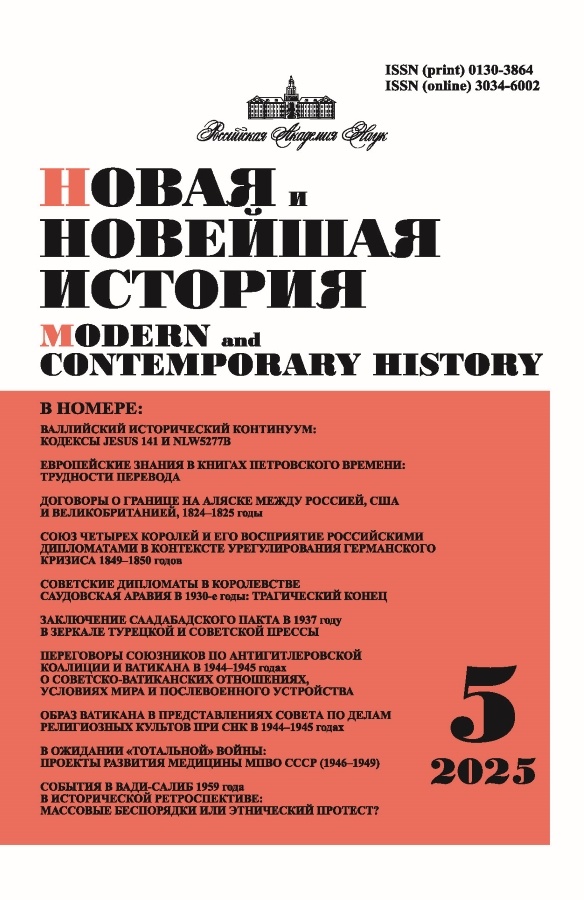External Relations of the Canton of Zurich in 2005–2024: Institutions, Priorities, and Main Directions
- Autores: Minkova K.V.1, Subbotin I.A.1,2
-
Afiliações:
- Saint-Petersburg State University
- MGIMO University
- Edição: Nº 5 (2025)
- Páginas: 226-239
- Seção: Contemporary history
- URL: https://archivog.com/0130-3864/article/view/693055
- DOI: https://doi.org/10.31857/S0130386425050177
- ID: 693055
Citar
Texto integral
Resumo
The study of the external relations of constituent units within federal states – particularly Switzerland – is of enduring scholarly interest for several reasons. Firstly, an examination of the specific experience of the Swiss cantons in the sphere of external engagement may offer valuable insights for enhancing the external relations frameworks of Russia’s federal subjects. Secondly, an analysis of the division of powers between the federal government and the cantons could contribute to the further development of the Russian model of federalism. This article aims to identify the principal features of the Canton of Zurich’s external relations in the period from 2005 to 2024. To this end, it examines the legal and institutional foundations underpinning Zurich’s external engagement, outlines its priorities and interests, and analyses the main directions pursued over this period. The specific focus on Zurich enables a detailed exploration of the theoretical and practical dimensions of subnational external relations in Switzerland – an area that has received limited attention in both Russian and international scholarship to date. The study concludes that the Canton of Zurich enjoys substantial autonomy in this domain and has developed a range of innovative mechanisms to advance its interests abroad. The sophistication of Zurich’s external relations, together with the strengths of the Swiss federal model more broadly, may serve as a useful point of reference for Russian regions – particularly those that are economically advanced and situated along national borders.
Palavras-chave
Sobre autores
K. Minkova
Saint-Petersburg State University
Autor responsável pela correspondência
Email: k.minkova@spbu.ru
Saint-Petersburg, Russia
I. Subbotin
Saint-Petersburg State University; MGIMO University
Email: iliasubb@mail.ru
Saint-Petersburg, Russia; Moscow, Russia
Bibliografia
- Акимов Ю.Г. Международная деятельность субнациональных акторов и внешняя политика государства: варианты взаимодействия и интерпретации // Сравнительная политика. 2021. T. 12. № 3. С. 33–41.
- Акимов Ю.Г. Внешнеполитическая деятельность субъектов федераций и конституционный процесс в федеративных государствах (на примере Канады, Бельгии и Испании) // Труды кафедры истории нового и новейшего времени. Вып. 12. СПб., 2014. С. 97–107.
- Бабынина Л.О. Говорова Н.В., Тимошенкова Е.П. Европейский Союз и Швейцария: разнонаправленные векторы сотрудничества // Современная Европа. 2015. № 2. С. 34–47.
- Дубровина О.Ю. Влияние регионов государств на внешнюю политику и международные отношения. М., 2018.
- Дубровина О.Ю. Швейцария: распределение полномочий между конфедерацией и кантонами в сфере международных отношений // Современная Европа. 2019. № 1. С. 70–79.
- Ермакова Э.В. Усиление роли институтов ЕС в продвижении внешней региональной деятельности стран-членов // Вестник МГИМО-Университета. 2014. № 4. С. 222–230.
- Колыхалов М.И. Модель и особенности международных связей кантонов Швейцарии // Власть. 2017. № 7. С. 182–186.
- Логвинова И.В. Международные связи кантонов Швейцарии: вопросы права и управления // Вестник РГГУ. Серия «Экономика. Управление. Право». 2020. № 3. С. 122–133.
- Плотникова О.В. Международные связи регионов государств: характеристика и особенности. М., 2020.
- Степанова С.В. Швейцария и Европейский союз: становление взаимоотношений // Вестник Рязанского государственного университета им. С.А. Есенина. 2016. № 2. С. 82–90.
- Barnett L. Canada’s approach to the treaty-making process. Ottawa, 2021.
- Bochsler D. Neighbours or Friends? When Swiss Cantonal Governments Co-operate with Each Other // Regional and Federal Studies. 2009. Vol. 19. № 3. P. 34–370.
- Duchacek I.D. Perforated Sovereignties: Towards a Typology of New Actors in International Relations // Federalism and International Relations: The Role of Subnational Units / eds H.J. Michelmann, P. Soldatos. Oxford, 1990. P. 1–33.
- Freiburghaus R. Lobbyierende Kantone: Subnationale Interessenvertretung im Schweizer Föderalismus. Baden-Baden, 2024.
- Kuznetsov A. Theory and Practice of Paradiplomacy: Subnational Governments in International Affairs. London; New York, 2015.
- Morin J.-F., Fournier V., Paquin S. The Federated Entities in Environmental Treaties (FEET) Dataset: Questioning Conventional Wisdom on Green Paradiplomacy // Canadian Journal of Political Science. 2022. Vol. 55. P. 226–241.
- Soldatos P. An Explanatory Framework for the Study of Federated States as Foreign-Policy Actors // Federalism and International Relations: The Role of Subnational Units / eds H.J. Michelmann, P. Soldatos. Oxford, 1990. P. 34–57.
- Spatial Planning and Sustainable Development Working Group of the Alpine Convention. Cross-border spatial development in the Alpine Convention area. Bozen, 2022.
- Wildhaber L. External Relations of the Swiss Cantons // Canadian Yearbook of International Law. 1974. Vol. 12. P. 211–221.
- Wolff S. Paradiplomacy: Scope, Opportunities and Challenges // The SAIS Europe Journal of Global Affairs. 2007. Vol. 10. P. 141–150.
Arquivos suplementares










